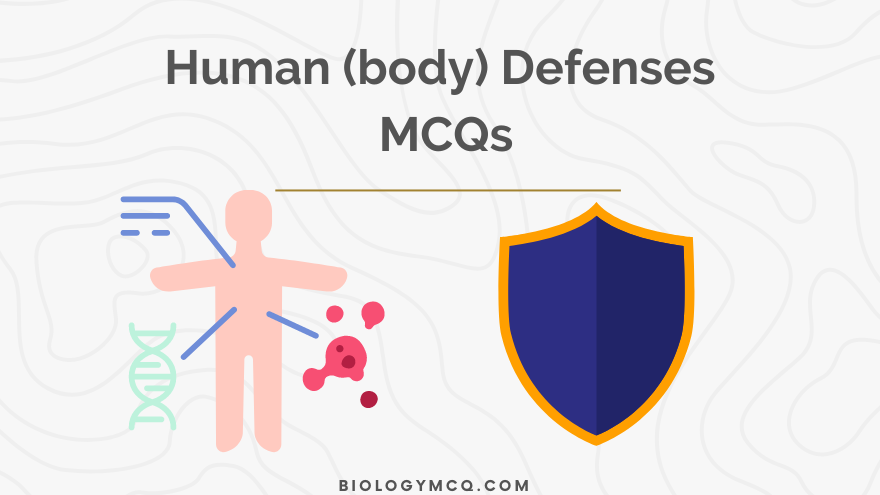Study and Learn with 1000s of Biology MCQs
Human (body) Defenses MCQs

These multiple-choice questions (MCQs) on human body defenses explores the various components and processes involved in the body’s immune response.
Topics covered include the immune system, including innate and adaptive immunity, white blood cells, antibodies, vaccination, and immune disorders.
Answering these MCQs will not only help you understand the mechanisms of immune defense but also deepen your knowledge of immunology and human biology.
Ready to explore the fascinating world of human body defenses? Let’s Start
MCQ on Human body Defenses
when you’re dealing with the reproduction of an alien invader. Your _ system springs into action, activating the cells necessary to fight the invasion
immune
digestive
circulatory
None of these
immune
Your _ are the barriers that physically block access to your tissues and organs
skin and mucous membranes
pH of your stomach acid
Dendritic cells
phagocytes
skin and mucous membranes
The _ is a chemical barrier that prevents microbial growth
skin and mucous membranes
pH of your stomach acid
Dendritic cells
phagocytes
pH of your stomach acid
Human body defenses refer to the intricate systems and mechanisms that protect the body from harmful pathogens, toxins, and foreign invaders.
These defenses are essential for maintaining health and preventing infections, diseases, and other illnesses.
_ patrol your body in search of microbes and alert your immune system of impending invasions
skin and mucous membranes
pH of your stomach acid
Dendritic cells
phagocytes
Dendritic cells
_ are certain white blood cells that seek and destroy microbes that have successfully entered your body
skin and mucous membranes
pH of your stomach acid
Dendritic cells
phagocytes
phagocytes
_ is the alarm call that gathers white blood cells to the site of an invasion and helps contain and destroy the microbes
skin and mucous membranes
pH of your stomach acid
Dendritic cells
Inflammation
Inflammation
The mucus in your nose and throat and the hairs in your nose act as _ that trap microbes
harmones
filters
Protein transporters
None of these
filters
Your _ screens your body fluids for the presence of microbes and destroys any it finds
Nervous system
lymphatic system
respiratory system
digestive system
lymphatic system
_ is a built-in immune system that all humans have
innate immunity
adaptive immunity
Both of these
None of these
innate immunity
_ is the part of your immune system that develops as you encounter microbes
innate immunity
adaptive immunity
Both of these
None of these
adaptive immunity
Certain cells of your immune system, called _ cells, remain in a semiactivated state after your first encounter with a microbe
memory
Epithelial
Cardiac
muscle
memory
One example of an autoimmune disease is?
Arthritis
AIDS
cancer
smallpox
Arthritis
In _____, the cells of the immune system attack the cells lining the joint spaces, causing inflammation and deterioration
AIDS
cancer
smallpox
Arthritis
Arthritis



